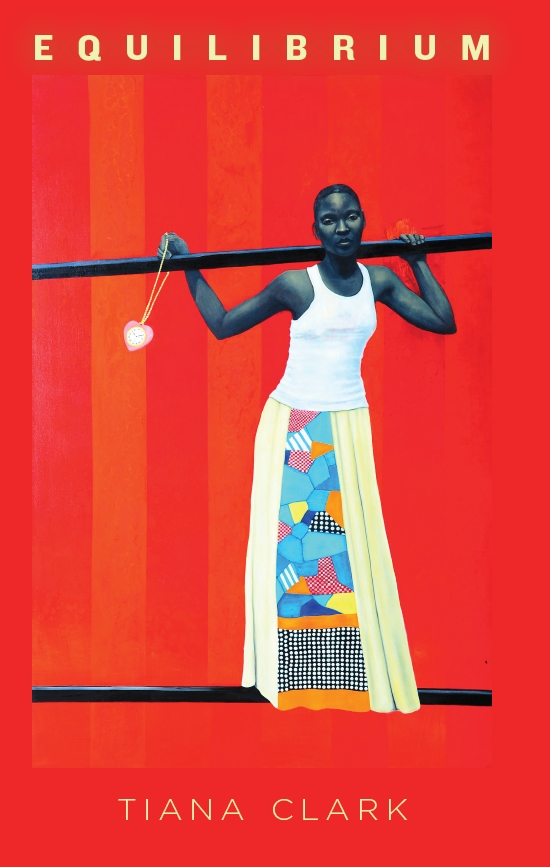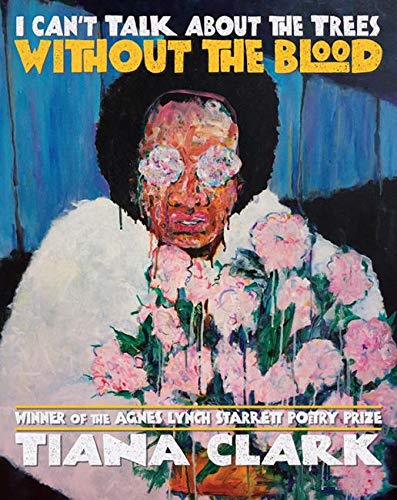Tiana Clark Award-Winning Poet, Essayist, and Professor
About the Author
Tiana Clark is the author of the poetry collection, I Can’t Talk About the Trees Without the Blood (University of Pittsburgh Press, 2018), winner of the 2017 Agnes Lynch Starrett Prize, and Equilibrium (Bull City Press, 2016), selected by Afaa Michael Weaver for the 2016 Frost Place Chapbook Competition. Clark is a winner for the 2020 Kate Tufts Discovery Award (Claremont Graduate University), a 2019 National Endowment for the Arts Literature Fellow, and the 2015 Rattle Poetry Prize.
She is a recipient of the 2021-2022 Amy Lowell Poetry Traveling Scholarship and 2019 Pushcart Prize. Clark is the 2017-2018 Jay C. and Ruth Halls Poetry Fellow at the Wisconsin Institute of Creative Writing. She is the recipient of scholarships and fellowships to the Bread Loaf Writers’ Conference, Sewanee Writers’ Conference, and Kenyon Review Writers Workshop. Clark is a graduate of Vanderbilt University (M.F.A) and Tennessee State University (B.A.) where she studied Africana and Women’s studies.
Her writing has appeared in or is forthcoming from The New Yorker, Poetry Magazine, The Atlantic, The Washington Post, Virginia Quarterly Review, Tin House Online, Kenyon Review, BuzzFeed News, American Poetry Review, Oxford American, The Best American Poetry 2022, and elsewhere. She teaches at the Sewanee School of Letters and is the Grace Hazard Conkling Writer-in-Residence at Smith College.
Clark is currently working on her next two books, Begging to be Saved, a memoir-in-essays reckoning with Black burnout, millennial divorce, faith, art making, and what lies on the other side of survival; and Scorched Earth, a poetry collection, tracing the complexities of relationship beginnings and endings, loneliness, desire, and joy.
Suggested Topics
- Begging to be Saved
- Proof
- I Can’t Talk About the Trees Without the Blood
- Equilibrium
Raves and Reviews
Praise for I Can’t Talk About the Trees Without the Blood
![]() If Tiana Clark’s I Can’t Talk About the Trees Without the Blood were a blank book bearing that title alone, I would still feel like I was in the presence of a profound lyric gift. It’s astonishing, the heft of that declaration, and the way these poems rise up to meet its rigor and clarity. Toni Morrison commanded writers to “make it political as hell, and make it irrevocably beautiful.” Clark, as if in response, writes, “Let us marvel at the Love and Grace that bought / and brought us here.” The formal dexterity of these poems, the vision that takes us from Daphne to Lorca to Phillis Wheatley to Balanchine to Rihanna to Rukeyser, announces a significant and comprehensive new poetic talent. This beauty is irrevocable—Clark has written one of the best first books of poetry I have ever read.”
If Tiana Clark’s I Can’t Talk About the Trees Without the Blood were a blank book bearing that title alone, I would still feel like I was in the presence of a profound lyric gift. It’s astonishing, the heft of that declaration, and the way these poems rise up to meet its rigor and clarity. Toni Morrison commanded writers to “make it political as hell, and make it irrevocably beautiful.” Clark, as if in response, writes, “Let us marvel at the Love and Grace that bought / and brought us here.” The formal dexterity of these poems, the vision that takes us from Daphne to Lorca to Phillis Wheatley to Balanchine to Rihanna to Rukeyser, announces a significant and comprehensive new poetic talent. This beauty is irrevocable—Clark has written one of the best first books of poetry I have ever read.”
—Kaveh Akbar
![]() Critiquing the commodification of black pain while also acknowledging and revealing your hurt as a black person is tricky as hell. It is dangerous. And that is precisely what Tiana Clark does in these beautiful, vulnerable, honest poems. It is a kind of tenderness, and a kind of belief. A reaching toward. It is a kind of care.”
Critiquing the commodification of black pain while also acknowledging and revealing your hurt as a black person is tricky as hell. It is dangerous. And that is precisely what Tiana Clark does in these beautiful, vulnerable, honest poems. It is a kind of tenderness, and a kind of belief. A reaching toward. It is a kind of care.”
—Ross Gay
![]() Superlatives for new poets are distressingly common these days, so a reader may not believe me when I say this debut collection is a book that I have waited for all my life. It is a book of relentless beauty about all the territory African-Americans hold close under whispered breaths, an accumulation of history and beauty that I find heartbreaking and breathtaking. More than necessary reading; it’s soul-saving. Read it, and be changed and redeemed.”
Superlatives for new poets are distressingly common these days, so a reader may not believe me when I say this debut collection is a book that I have waited for all my life. It is a book of relentless beauty about all the territory African-Americans hold close under whispered breaths, an accumulation of history and beauty that I find heartbreaking and breathtaking. More than necessary reading; it’s soul-saving. Read it, and be changed and redeemed.”
—Allison Joseph, author of Confessions of a Barefaced Woman
![]() It’s in this boundless imagination and versatility that Clark earns a place among the pantheon of such emerging black poets as Eve Ewing, Nicole Sealy, and Airea D. Matthews.”
It’s in this boundless imagination and versatility that Clark earns a place among the pantheon of such emerging black poets as Eve Ewing, Nicole Sealy, and Airea D. Matthews.”
—Booklist starred review
![]() Clark bridges a Tennessee landscape’s past and present in her stellar debut, evincing a potent mix of history, injury, and divided identity.”
Clark bridges a Tennessee landscape’s past and present in her stellar debut, evincing a potent mix of history, injury, and divided identity.”
—Publishers Weekly starred review
![]() An honest, punch-angry portrait of being American while black.”
An honest, punch-angry portrait of being American while black.”
—Library Journal
![]() Such commitment and bravery on the page are vital to this moment in our region’s history, when the calls for a deep reckoning with out troubled legacy have met a dangerous level of entrenchment. With I Can’t Talk About the Trees Without the Blood, Clark emerges as a necessary voice from the contemporary South.”
Such commitment and bravery on the page are vital to this moment in our region’s history, when the calls for a deep reckoning with out troubled legacy have met a dangerous level of entrenchment. With I Can’t Talk About the Trees Without the Blood, Clark emerges as a necessary voice from the contemporary South.”
—Chapter 16
In the Media
September 11, 2023
October 2, 2017
“Considering Roe V. Wade, Letters to the Black Body”
June 25, 2022
“Broken Sestina Reaching For Black Joy”
September 17, 2021
January 24, 2021
“New Ways of Surviving: Writing Through a Global Pandemic”
April, 2021
“The surreal anticlimax of getting divorced over videoconference”
June 23, 2020
“We keep revising our idea of Emily Dickinson. We may never get her right.”
December 13, 2019
“This Is What Black Burnout Feels Like”
January 11, 2019





